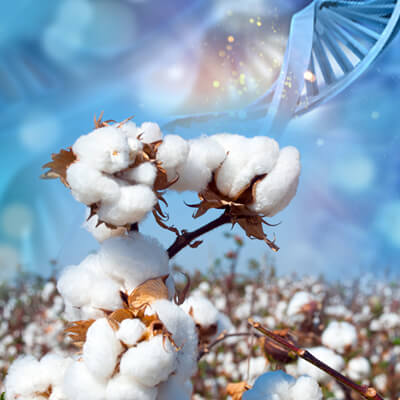
Forensic Authentication of Cotton in Fiber, Yarn, Fabric and Finished Goods
STONY BROOK, N.Y., May 30, 2019. Applied DNA Sciences, Inc. (“Applied DNA,” “the Company,” NASDAQ: APDN), today announced that it has closed the loop on traceability for Egyptian Pima using DNA-based genotyping assays for cotton authentication. These assays have been used to verify fiber and will be extended to yarn, fabric and finished goods in an ongoing validation program. The Egyptian Pima developments join and expand a series of US Pima cotton assays performed within Applied DNA testing services and are based on work conducted over the past 3 years related to the validation of a known library of cotton cultivar standards.
“This solution closes the loop for the cotton industry that has been under a cloud of controversy surrounding evidence of cotton products labeled as Egyptian cotton versus those which are actually grown in Egypt. There is no substitute for DNA analysis when it comes to cotton traceability and transparency because of its ability to do what other technologies cannot do, which is to forensically authenticate the fiber through to yarn and finished goods,” stated Dr. Michael Hogan, vice president, Life Sciences, Applied DNA. When paired with SigNature® T DNA tagging, testing and tracking of cotton at the gin, it is expected that these new cotton assays, along with other methods of fiber quantitation in the development pipeline at Applied DNA, can now broaden our multiple-parameter analysis to verify the type of cotton, the cotton’s origin, and the blending of the cotton fiber (both valid and surreptitious) during the journey from the ginned fiber to a finished textile product.
In August 2016, the controversy of home bedding and other products labeled 100% Egyptian Cotton hit an all-time high when a number of US retailers recalled many products from retail shelves due to label claim violations, and consumers were informed that products did not meet the standard or label requirement. Three years later, Applied DNA will begin to validate and market test products that are labeled to contain 100% Egyptian Pima in addition to these services for US Pima. Recently, a federal judge ruled that several “Big Box” stores must face lawsuits claiming they sold linens falsely labeled “Egyptian Cotton.” Applied DNA believes its new Egyptian genotyping assays could assist in protecting against such an imbroglio if the retailers used this technology in their supply chains to verify their goods.
“Our cotton authentication platform of SigNature T and genotyping can provide a means for quality control and compliance in supply chains. Many products use cotton grown in the US and Egypt, and we believe that our system can provide a useful tool to enable brands and manufacturers to verify their products at any stage of the supply chain, that is more exact than other methods claiming to do the same without the same degree of precision,” stated Dr. James Hayward, president and CEO of Applied DNA.
“The Himatsingka Group remains committed to bringing cotton traceability for all major varietals of cotton including Egyptian cotton, while maintaining the highest standards of traceability solutions and quality control mechanisms. We applaud Applied DNA for advancing the solutions for the cotton industry as we believe that DNA science is the new standard for purity and authenticity,” stated Shrikant Himatsingka, CEO of The Himatsingka Group.
About Applied DNA Sciences
Applied DNA is a provider of molecular technologies that enable supply chain security, anti-counterfeiting and anti-theft technology, product genotyping and pre-clinical nucleic acid-based therapeutic drug candidates.
Applied DNA makes life real and safe by providing innovative, molecular-based technology solutions and services that can help protect products, brands, entire supply chains, and intellectual property of companies, governments and consumers from theft, counterfeiting, fraud and diversion.
Visit adnas.com for more information. Follow us on Twitter and LinkedIn. Join our mailing list.
Common stock listed on NASDAQ under the symbol APDN, and warrants are listed under the symbol APDNW.
Forward-Looking Statements
The statements made by Applied DNA in this press release may be “forward-looking” in nature within the meaning of the Private Securities Litigation Act of 1995. Forward-looking statements describe Applied DNA’s future plans, projections, strategies and expectations, and are based on assumptions and involve a number of risks and uncertainties, many of which are beyond the control of Applied DNA. Actual results could differ materially from those projected due to its history of net losses, limited financial resources, limited market acceptance, ability to maintain its NASDAQ listing and various other factors detailed from time to time in Applied DNA’s SEC reports and filings, including our Annual Report on Form 10-K filed on December 18, 2018 and our subsequent quarterly reports on Form 10-Q filed on February 7, 2019 and May 9, 2019, and other reports we file with the SEC, which are available at www.sec.gov. Applied DNA undertakes no obligation to update publicly any forward-looking statements to reflect new information, events or circumstances after the date hereof to reflect the occurrence of unanticipated events, unless otherwise required by law.
investor contact: Sanjay Hurry, LHA Investor Relations, 212-838-3777, shurry@lhai.com
media contact: Meryl Rader, 781-639-4924, meryl@cgprpublicrelations.com
program contact: MeiLin Wan, 631-240-8849, meilin.wan@adnas.com


